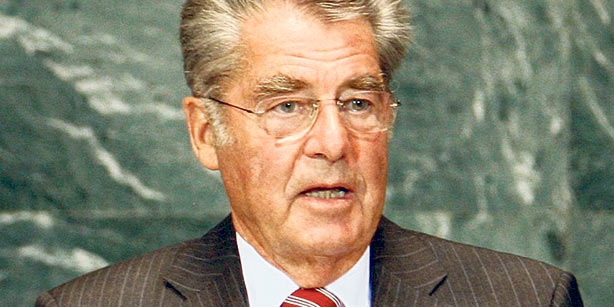 VIENNA, April 2 (Reuters) - Austrian President Heinz Fischer has 'in principle' accepted an invitation to visit Iran, his office said on Wednesday, in what would be the first trip for many years by a Western head of state.
VIENNA, April 2 (Reuters) - Austrian President Heinz Fischer has 'in principle' accepted an invitation to visit Iran, his office said on Wednesday, in what would be the first trip for many years by a Western head of state.Under President Hassan Rouhani, a relative moderate who was elected last year, Iran has started to improve relations with the West by engaging with world powers over its disputed nuclear programme.
It remains under sanctions, however, and a visit by Fischer, perhaps accompanied by�business�leaders, would be fraught with political significance as the United States presses Western countries to limit commerce with Tehran.
"The invitation from the Iranian side has been accepted in principle but no date has been set," Fischer's spokesman said, declining to give any more details given the delicate diplomacy at stake.
Fischer stood side by side with visiting Israeli President Shimon Peres this week as Peres urged Western countries to keep up the pressure on Tehran over its disputed nuclear programme.
No Western head of state visited Iran under either of Rouhani's predecessors - Mohammad Khatami, who was president from 1997 to 2005, or Mahmoud Ahmadinejad.
Austria, a neutral European Union member, was for centuries a bridgehead for Iran to Europe. Lately it has been hosting talks between Tehran and six world powers that seek to expand on an interim deal last year in which Iran agreed to freeze parts of its nuclear programme in return for limited relief from sanctions.
MID-YEAR PRESIDENTIAL VISIT?
Austrian Foreign Minister Sebastian Kurz will travel this month to both�Israel�and Iran, his ministry said. Israel is an enemy of Iran which has condemned the interim nuclear deal and believes Tehran is on the path to acquiring nuclear weapons - an allegation Iran strenuously denies.
A spokesman for Kurz's ministry said the programme for the Iran trip was still under discussion. "Austria will in any case discuss the human rights situation as well as its nuclear programme," he said, adding that Kurz would not be accompanied by a business delegation.
A senior U.S. official visited Vienna in January to voice concern that Austrian companies, hoping to win post-sanctions business in Iran, had visited Tehran in December.
One diplomatic source said Fischer could visit Iran by mid-year "but this depends on a lot of things", including the status of the nuclear talks, which are aimed at reaching a comprehensive agreement by late July.
Iran last month warned the Austrian embassy in Tehran after it hosted a meeting between EU foreign policy chief Catherine Ashton and Iranian human rights activists during her first visit to Iran.
But the flap appears not to have derailed ties severely.
Iranian Foreign Minister Mohammed Javad Zarif later in March spent more than an hour and a half meeting members of Austria's parliament to discuss Iranian relations with the West, its nuclear programme, human rights and the situation in�Syria, participants said.
European companies are sizing up the potential of an end to the economic isolation of Iran, attracted by its young population of 76 million people, its urgent need to overhaul its creaking infrastructure, and its massive oil and gas reserves.
Austrian trade with Iran declined last year, with imports down 87 percent to 16 million euros ($22 million) and exports off 15 percent to 185 million, according to preliminary data.
By Reuters
The Iran Project is not responsible for the content of quoted articles.











